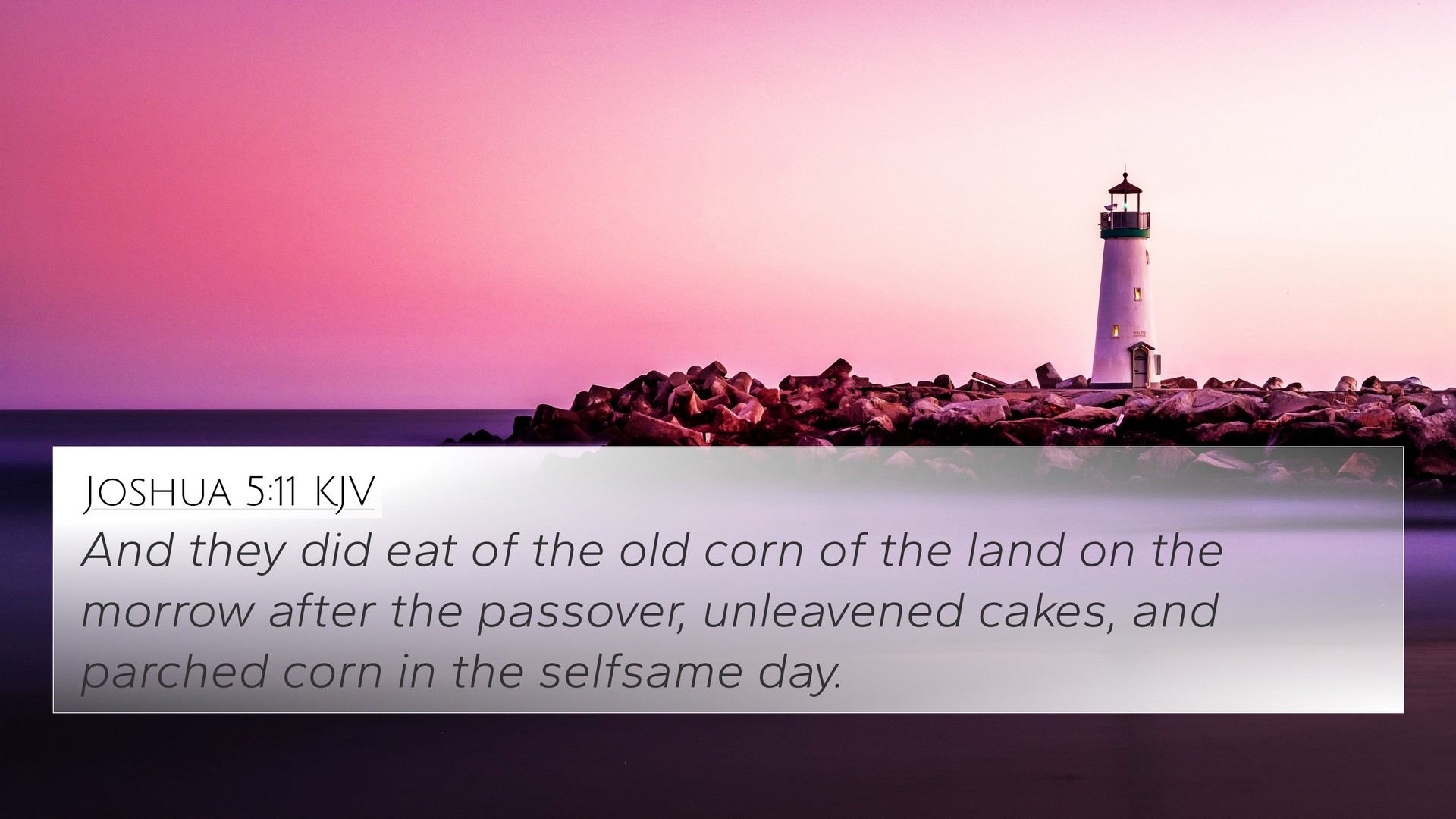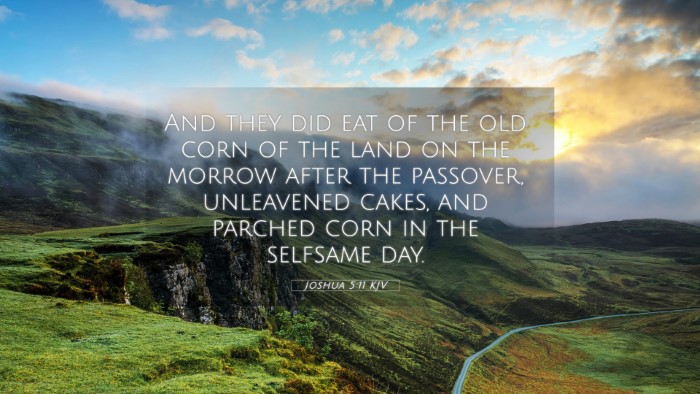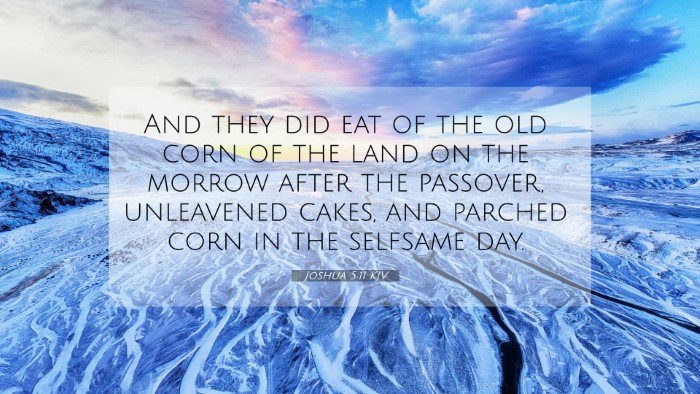Old Testament
Genesis Exodus Leviticus Numbers Deuteronomy Joshua Judges Ruth 1 Samuel 2 Samuel 1 Kings 2 Kings 1 Chronicles 2 Chronicles Ezra Nehemiah Esther Job Psalms Proverbs Ecclesiastes Song of Solomon Isaiah Jeremiah Lamentations Ezekiel Daniel Hosea Joel Amos Obadiah Jonah Micah Nahum Habakkuk Zephaniah Haggai Zechariah MalachiJoshua 5:11 Similar Verses
Joshua 5:11 Cross References
And they did eat of the old corn of the land on the morrow after the passover, unleavened cakes, and parched corn in the selfsame day.
Uncover the Rich Themes and Topics of This Bible Verse
Listed below are the Bible themes associated with Joshua 5:11. We invite you to explore each theme to gain deeper insights into the Scriptures.
Joshua 5:11 Cross Reference Verses
This section features a detailed cross-reference designed to enrich your understanding of the Scriptures. Below, you will find carefully selected verses that echo the themes and teachings related to Joshua 5:11 KJV. Click on any image to explore detailed analyses of related Bible verses and uncover deeper theological insights.
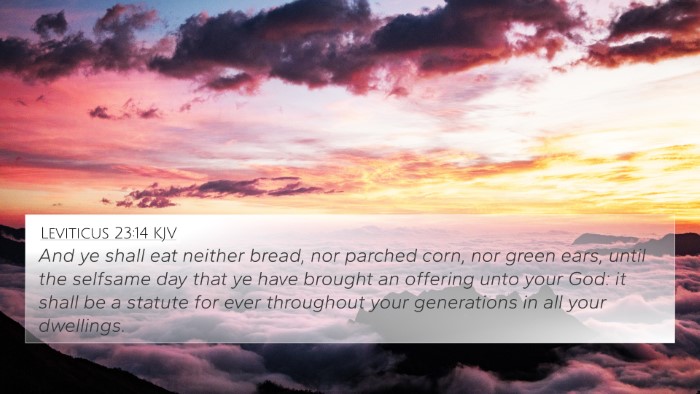
Leviticus 23:14 (KJV) »
And ye shall eat neither bread, nor parched corn, nor green ears, until the selfsame day that ye have brought an offering unto your God: it shall be a statute for ever throughout your generations in all your dwellings.
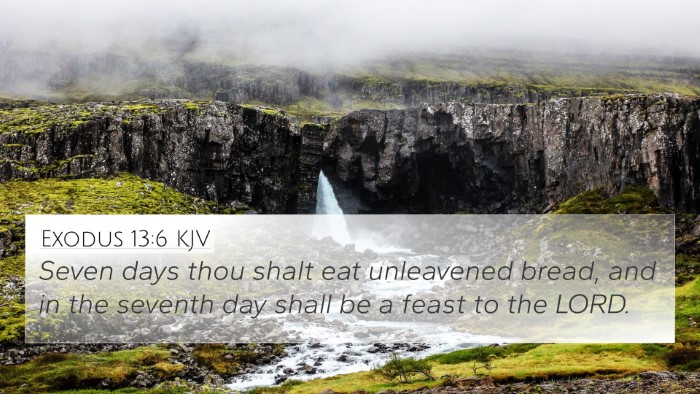
Exodus 13:6 (KJV) »
Seven days thou shalt eat unleavened bread, and in the seventh day shall be a feast to the LORD.
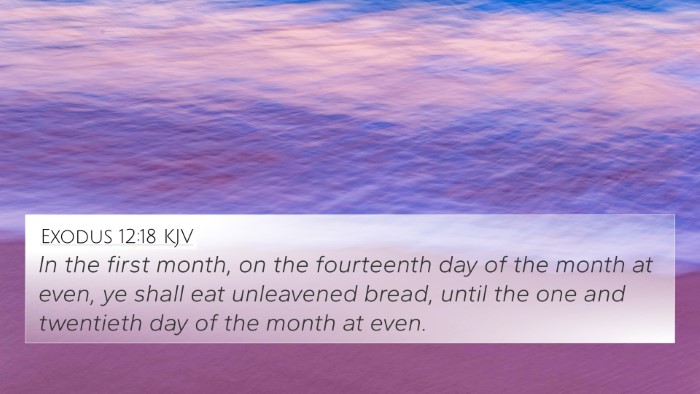
Exodus 12:18 (KJV) »
In the first month, on the fourteenth day of the month at even, ye shall eat unleavened bread, until the one and twentieth day of the month at even.

Leviticus 23:6 (KJV) »
And on the fifteenth day of the same month is the feast of unleavened bread unto the LORD: seven days ye must eat unleavened bread.
Joshua 5:11 Verse Analysis and Similar Verses
Understanding Joshua 5:11
Verse Reference: Joshua 5:11 - "And they did eat of the old corn of the land on the morrow after the Passover, unleavened cakes, and parched corn in the selfsame day."
Summary of the Verse
This verse marks a significant moment in Israel's history as they begin to partake of the produce of the Promised Land after their entrance. It highlights the transition from reliance on heavenly manna to the sustenance found within Canaan, the land promised by God to Abraham and his descendants.
Key Themes
- Transition and Fulfillment: This moment signifies the fulfillment of God's promise to deliver the Israelites into a land flowing with milk and honey.
- Symbolism of Manna: The cessation of manna is a parallel to spiritual sustenance; moving from dependence on miraculous provisions to enjoying God's blessings through the fruits of labor.
- Passover Significance: The timing of this event serves to reinforce the importance of deliverance marked by Passover, as the Israelites commemorate their liberation from Egypt.
Interpretation Insights
Matthew Henry: In his commentary, Henry emphasizes the meticulous care of God in providing for His people throughout their journey. The shift from manna to the produce of Canaan is a sign of maturity and a deeper relationship with God, who continues to care for His people.
Albert Barnes: Barnes remarks on the communal aspect of the meal, drawing attention to the unity among the Israelites. Eating together of the old corn points to their collective identity as a people who belong to God and share in His blessings together.
Adam Clarke: Clarke highlights the importance of rituals such as the Passover and the act of eating the produce of the land as signs of God's faithfulness and productivity. He notes that the act of eating in the Promised Land is profound as it represents not only sustenance but also divine favor.
Related Bible Verses
This verse can be cross-referenced with several others that explore similar themes of promise, sustenance, and community:
- Exodus 12:14: Discusses the significance of Passover, a precursor to the events of Joshua, emphasizing deliverance.
- Numbers 14:8: Promises of flourishing in the land, linking the theme of inheritance to divine favor.
- Deuteronomy 8:8: Describes the bounty of the land, affirming the richness of Canaan in comparison to past hardships.
- Psalms 107:36-38: God's provision in the fruitful land, confirming that He blesses His people with abundance.
- 1 Corinthians 10:3-4: Highlights the spiritual significance of food and drink in the Light of Christ, linking it to the symbolism of old covenant practices.
- Numbers 11:9: Reflects on the manna that was provided beforehand, creating a contrast with their current consumption.
- John 6:49-51: Jesus refers to the manna as a precursor to His life-giving sacrifice, establishing a parallel to God’s continued provision.
Applications and Reflections
Today, this passage serves as a powerful reminder of God's faithfulness to fulfill His promises. Believers can reflect on their own journeys, recognizing transitions from reliance on spiritual ‘manna’ towards the tangible blessings manifested in their lives.
For study groups and individual devotion, engaging with this verse through cross-references enhances understanding. Utilizing tools such as a Bible concordance or a cross-reference Bible study guide can help uncover the rich interconnectedness of Scriptures.
Using Cross-References for Deeper Insight
By employing comprehensive Bible cross-reference materials, Christians can identify the profound connections that enrich the understanding of biblical texts. The act of cross-referencing invites deeper engagement with Scripture, fostering spiritual growth and insight.
Conclusion
Joshua 5:11 encapsulates a moment of fulfillment and celebration for the Israelites, as they taste the fruits of the land promised by God. By recognizing this transition, believers today are invited to consider their own spiritual journeys and the abundant provision God offers. Through careful study and cross-referencing, deeper insights into Scripture can be gained, revealing the ongoing dialogue within the Bible and its relevance to modern faith.
